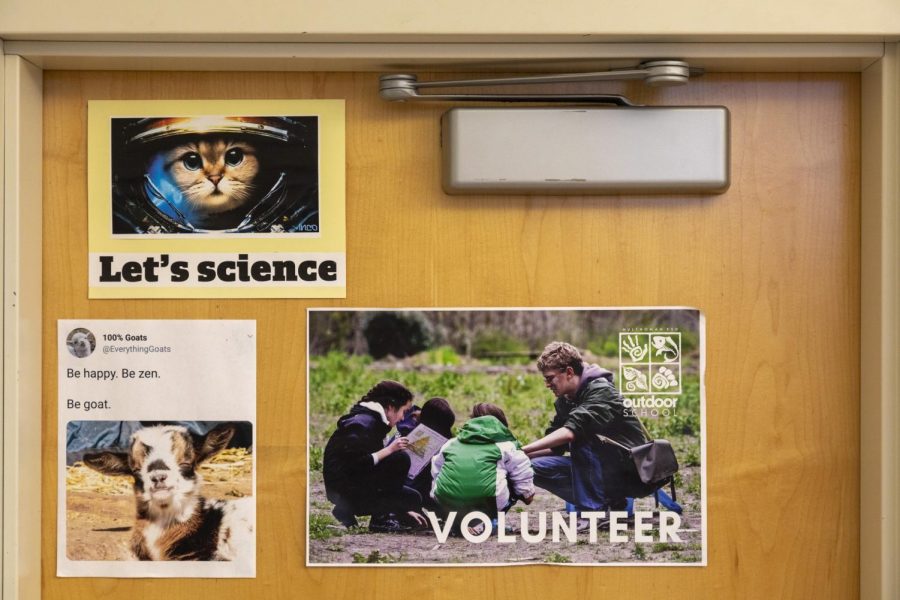Outdoor School: The Best Program Oregon Has to Offer for High School Students
A poster in a science classroom quietly advertises the Outdoor School program.
March 11, 2020
You might remember going to Outdoor School in sixth grade. However, something you might not remember is the Student Leaders who organized your time there, which is why you should give yourself the incredible and rewarding experience of volunteering for this program to give back to that community.
Outdoor School (ODS) is a week-long program offered here in Oregon that gives sixth-grade students the opportunity to learn, eat, sleep, and live in nature for five days while also giving high school students an even better opportunity to become a Student Leader at a site that is often utilized in the summer as a recreational camp.
During my time spent volunteering as a sophomore, I got to challenge myself by doing something I wasn’t used to, and took the chance to learn about who I am, how to live a respectful life, and finally how to become a leader.
This program relies heavily on Oregon high school students to volunteer their time by becoming Student Leaders. This cuts down the need for hundreds of full-time employees, and allows high schoolers to learn valuable skills and gain experience as leaders.
One reservation I had about the program at first was that I am a shy person. I struggle with social anxiety disorder, and yet I found that at ODS I was able to grow out of my habits of staying quiet and letting others handle the issues in my community. Through ODS, I learned how to gain and keep people’s attention in a group setting, while still making sure I was able to give people all the information they needed.
The ODS program helped me realize that in the past I had often let my discomfort take advantage of me in situations where I could have been using my abilities to help someone else. I was placed in situations where I had to teach, lead, and care for a group of other human beings, something that the day-to-day life as a high schooler didn’t offer me.
To become a Student Leader in the ODS program, high school students first sign up for a workshop where they get the opportunity to learn about the program, the valuable skills offered, and about the site they hope to attend.
When you attend the workshop, you are immediately thrown into a cabin full of aspiring or current Student Leaders. There, you get to spend two days living the life of an Outdoor School Student Leader, where you are introduced to the staff members, given a tour of the site, and are allowed to gain a general idea about what a typical Outdoor School day looks like.
You also learn the complex qualities of being a Student Leader while attending the workshop. You are taught about safety, respect, care, your required field study, and how to build strong connections with people from a multitude of different backgrounds.
At ODS, there is a larger focus on community in comparison to the average high school life. During my time at Outdoor School, I had the opportunity to practice many skills that I typically do not get to use in my typical life, such as self-care, helping others with their work, or even teaching others about animals, which was my assigned field study.
While there, I noticed myself laughing with strangers, learning about who they were, where they came from, and why they were there.
The biggest challenge going into the program was missing a week of school. While I realized that it would be a lot of work to take a week off from school, I also hoped that if my session was anything like the workshop I went to, it would certainly be worth the missed classwork. As the date crept closer to my session, I had a feeling it would be worth it.
Despite this feeling, nervousness also bubbled up within me. I’m not much of a morning person, I despise the cold weather, I didn’t know many people, and I was unsure of what to expect. Nonetheless, I didn’t give in to those thoughts and boarded the bus to my assigned site, Namanu.
Namanu is the summer camp I have attended outside of ODS for four summers now. I attend a recreational camp there, where I spend one week every year laughing with friends, living outdoors, growing up, and just spending time away from society on a beautiful 552 acre property. It holds a very special place in my heart, so I naturally chose it as my ODS site as well.
Once we arrived, I helped unload the bus and checked in. Then, I anxiously waited to board another bus that would take me to the place I would call home for the next five days.
While I sat on the bus anxiously awaiting Outdoor School, I came up with my outdoor school nickname, “Auto,” due to my love of cars. From that point on, I was Auto for the next five days – no longer Isaac – which is one of the things that takes some time to get used to at the program.
I got used to this new name by working through my first assignment of breaking the ice with my new colleagues. We played plenty of name games and even sang a few songs, which grew to be an exciting introduction to Outdoor School. The nervousness that I had started with was already starting to melt away as it turned into excitement for the opportunities ahead.
After a busy first night, I spent the next five days doing all sorts of activities such as field study, recreation, cabin time, campfire, and social hour. Every morning at breakfast, Student Leaders are given a schedule full of information so you would know the plan for that day.
Life at Outdoor School is very different from the normal world. Everyone eats together during dinner, you sleep together in cabins on bunk beds, you live away from modern technology as a group, and you do chores such as cleaning bathrooms or setting the tables, all while creating a community that you care for.
Never before have I had to live and be around my peers constantly like this. There was never time to be alone, mostly due to safety laws. I had never been in charge of a group, and felt challenged by making crucial decisions and making sure everyone is getting what they need. These skills are hard to learn, but they are a crucial part of strong leadership.
On top of everything I learned and practiced, I made plenty of new friends during my time at Outdoor School. My fellow Student Leaders and I still hang out occasionally, and we are constantly texting or Snapchatting with each other. I had no idea that there was such a strong community built during the short time of the ODS experience, but I now see their friendships as a great perk to an already rewarding program.
Although I started in an unfamiliar place with strangers at the beginning of ODS, by the end of the week I felt completely at home. I was in a place that cut out the faults of society and replaced those faults with great solutions. We used everyone’s preferred pronouns, promoted using living techniques that care for the Earth, and discussed and learned about climate change prevention.
There was also more focus on the things that are good about our world. I adored the way the ODS program leaned towards an optimistic view on the world, and led students to a positive mindset in handling our problems.
If you like to help others, I strongly encourage you to volunteer for the ODS program. However, if you feel like it’s just worth it for the service hours and getting the college credits that come with the volunteering, then you should probably rethink why you are doing it. Outdoor School is not for everyone, but I hope that most people get what I got out of it.
There is a list of requirements online for who can volunteer to become a Student Leader for Outdoor School, and one of these requirements is that you must be a sophomore, junior, or senior. Sorry freshmen, but don’t fret: I can assure you that it is well worth the wait.
If you are thinking about signing up, do it. ODS is easily one of the best programs for high schoolers. Even if you aren’t completely convinced now, sign up for the workshop and see if you enjoy the program to try it out and then make your decision. You won’t regret it.





